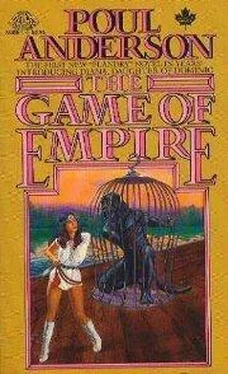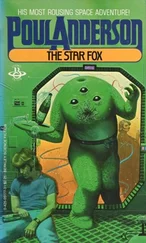Poul Anderson - The Game of Empire
Здесь есть возможность читать онлайн «Poul Anderson - The Game of Empire» весь текст электронной книги совершенно бесплатно (целиком полную версию без сокращений). В некоторых случаях можно слушать аудио, скачать через торрент в формате fb2 и присутствует краткое содержание. Год выпуска: 1985, ISBN: 1985, Издательство: Baen Books, Жанр: Космическая фантастика, на английском языке. Описание произведения, (предисловие) а так же отзывы посетителей доступны на портале библиотеки ЛибКат.
- Название:The Game of Empire
- Автор:
- Издательство:Baen Books
- Жанр:
- Год:1985
- ISBN:978-0-671-55959-5
- Рейтинг книги:4 / 5. Голосов: 1
-
Избранное:Добавить в избранное
- Отзывы:
-
Ваша оценка:
- 80
- 1
- 2
- 3
- 4
- 5
The Game of Empire: краткое содержание, описание и аннотация
Предлагаем к чтению аннотацию, описание, краткое содержание или предисловие (зависит от того, что написал сам автор книги «The Game of Empire»). Если вы не нашли необходимую информацию о книге — напишите в комментариях, мы постараемся отыскать её.
The Game of Empire — читать онлайн бесплатно полную книгу (весь текст) целиком
Ниже представлен текст книги, разбитый по страницам. Система сохранения места последней прочитанной страницы, позволяет с удобством читать онлайн бесплатно книгу «The Game of Empire», без необходимости каждый раз заново искать на чём Вы остановились. Поставьте закладку, и сможете в любой момент перейти на страницу, на которой закончили чтение.
Интервал:
Закладка:
Axor thundered up the ramp. “Diana, get down!” he bawled. “Both of you, behind me!”
They scrambled to obey. He hammered his mass against the weakened lock. At the third impact it sagged aside.
Four Merseians waited. Their uniforms revealed them to be soldiers, unqualified to fly the craft they defended. Rather than shut the inner valve and risk it being wrecked too, they had prepared to give battle. Merseians would.
Axor charged. Beams and bullets converged on him. That could not check such momentum. Two died under his hoofs before he collapsed, shaking the hull. Targovi and Diana came right after. The Tigery threw his knife. A handgun rattled off a bulkhead. He and the Merseian went down together, embraced. His fangs found the green throat. Diana eluded a shot, got in close, and wielded her own blade.
Targovi picked himself up. “They’ll’ve sent for help,” he rasped out of dripping jaws. “Lubberly warriors though Zacharians be, I give us less than ten minutes. While I discover how to raise this thing, you close the portal.” He whisked from sight.
The lock gave her no difficulty; the layout resembled that of Moonjumper. With the ship sealed, she made her way across a slippery deck to Axor. He lay breathing hard. Scorch marks were black over his scales. Redness oozed from wounds, not quite the same hue as hers, which was not quite the same as the Merseians’, but it was all blood—water, iron, life—“Oh, you’re so hurt,” she keened. “What can I do for you?”
He lifted his head. “Are you well, child?”
“Yes, nothin’ hit me, but you, darlin’, you—”
Lips drew back in a smile that others might have found frightening. “Not to fear. A little discomfort, yes, I might go so far as to say pain, but no serious injury. This carcass has many a pilgrimage ahead of it yet. Praises be to God and thanks to the more militant saints.” The head sank. Wearily, soberly, he finished, “Now let me pray for the souls of the fallen.”
A shiver went through Diana’s feet. Targovi had awakened the engines.
Atmospheric warcraft zoomed over hills and mountains. He did not try keying in an order to shoot. Instead, he outclimbed them. Missiles whistled aloft. By then he had learned how to switch on the deflector field.
And after that he was in space. The planet rolled beneath him, enormous and lovely, burnished with oceans, emblazoned with continents, white-swirled with clouds. Once more he saw stars.
He could only take a moment to savor. Single-handing, he hadn’t a meteorite’s chance against attack by any Naval unit. “Diana,” he said over the intercom, “come to the bridge, will you?” and devoted himself to piloting. He couldn’t instruct the autosystem the unfamiliar manual controls responded clumsily to him, and the navigational instruments were incomprehensible; he must eyeball and stagger his way. At least he’d managed to set a steady interior field of about a gee. Otherwise his comrades would be getting thrown around like chips in a casino.
Well, if he and they could walk from the landing, that was amply good—if they walked free.
The girl entered and took the copilot’s seat. “I hope to bring us down at Aurea port,” he told her. “No doubt the Zacharians will call frantically in, demanding the Navy blow us menaces out of the sky, and no doubt there are officers who will be happy to oblige. I lack skill to take us away on hyperdrive. You are the human aboard. What do you counsel?”
She considered, hand to smoke-smudged cheek—tangle-haired, sweaty, ragged, begrimed. Glancing at her, scenting her, knowing her, he wished he could be, for some hours, a male of her species.
“Can you set up a strong audiovisual transmission, that’ll punch through interference on the standard band?” she asked.
He studied the console before him. “I think I can.”
“Do.” She closed her eyes and sagged in her harness.
But when he was ready, she came back to strength. To the computer-generated face in the screen she said: “I have a message for Commandant General Cesare Gatto. It’s not crank, and it is top priority. If it don’t get straight to him, courts martial are goin’ to blossom till you can’t see the clover for ’em. The fact I’m in a spacecraft you’ll soon identify as Merseian should get you off your duffs. He’ll want a recognition code, of course. Tell him Diana Crowfeather is bound home.”
Chapter 21
The database contained much that became priceless to the Navy in its operations against the revolt. Some continued valuable afterward, to Terran Intelligence, until the Merseians had completed necessary changes of plan and organization— an effort which, while it went on, kept them out of considerable mischief abroad. A part of the record dealt with Sir Olaf Magnusson. From previous experience and knowledge, Flandry reconstructed more of the story, conjecturally but with high probability.
A man stern and righteous lived under an Imperium effete and corrupt. Emperor Georgios meant well, but he was long a-dying, and meanwhile the favorites of the Crown Prince crowded into power. After Josip succeeded to the throne, malfeasance would scarcely trouble to mask itself, and official after official would routinely order atrocities committed on outlying worlds entrusted to them, that wealth might be wrung into their coffers. Erik Magnusson, space captain and trader of Kraken, forswore in his heart all allegiance to the Empire that had broken faith with him.
Somehow a Merseian or two, among those whom he occasionally met, sensed the unhappiness in him and passed word of it on to those who took interest in such matters. Upon his next visit to their mother planet, he received baronial treatment. In due course he met the great lord—not the Roidhun, who has more often been demigod than ruler, but the chief of the Grand Council, the day-by-day master of that whole vast realm, insofar as any single creature could ever be.
This was Brechdan Ironrede, the Hand of the Vach Ynvory, an impressive being whose soul was in many respects brother to the soul of Captain Magnusson. Well did he know what would appeal. There were humans by race who were Merseian subjects, just as there were Merseians by race who were Terran subjects—tiny minorities in either case, but significant on many levels. Those whom Brechdan summoned must have joined their voices to his. Why should Kraken pay tribute to an Imperium which enriched toadies, fettered commerce, and neglected defenses? The law of the Roidhun was strict but just. Under him, men could again be men. United, the two civilizations would linger no more in this handful of stars on a fringe of the galaxy; they would fare forth to possess the cosmos.
Erik Magnusson was converted. Perhaps Aycharaych, the telepath, confirmed it.
The man must have realized how slight the chance was that he could ever be of important service. He might or might not recruit a few others, he might or might not sometimes carry a message or an agent, but basically he was a reservist, a silent keeper of the flame. At home he could not even declare openly his love for Merseia.
But the time came when he gave Merseia his son.
The boy Olaf accompanied him there and remained. Nobody on Kraken suspected aught amiss when Erik returned within him. Olaf’s mother was dead, his father had not remarried, his siblings had learned to refrain from pestering with questions. “I got him an apprentice’s berth on a prospector ship. He’ll learn more and better than in any of our schools.”
The secret school he did enter was neither human or humane. High among its undertakings was to strengthen the strong and destroy the weak. Olaf survived. He learned science, history, combat, leadership, and tearlessness. Toward the end, Aycharaych took him in charge, Aycharaych the Chereionite, he of the crested eagle countenance and the subtle, probing intellect. Merseian masters had laid a foundation in the boy: knowledge, physique, purpose. Upon it Aycharaych now raised the psychosexual structure he wanted.
Читать дальшеИнтервал:
Закладка:
Похожие книги на «The Game of Empire»
Представляем Вашему вниманию похожие книги на «The Game of Empire» списком для выбора. Мы отобрали схожую по названию и смыслу литературу в надежде предоставить читателям больше вариантов отыскать новые, интересные, ещё непрочитанные произведения.
Обсуждение, отзывы о книге «The Game of Empire» и просто собственные мнения читателей. Оставьте ваши комментарии, напишите, что Вы думаете о произведении, его смысле или главных героях. Укажите что конкретно понравилось, а что нет, и почему Вы так считаете.











